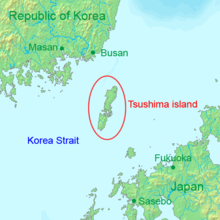Tsushima incident

The Tsushima incident occurred in 1861 when the Russians attempted to establish a year-round anchorage on the coast of the island of Tsushima, a Japanese territory located between Kyushu and Korea.[1]
British version of events
Arrival of the Posadnik
On 13 March 1861, the Russian
Clash
On 13 May 1861, the Russians sent a launch to explore the eastern coast of the island, despite the presence of two
Russian retreat
As this strategy did not work, the Japanese asked the British to intervene, as they also had an interest in preventing the Russians from extending their influence in Asia.[5] Admiral Hope arrived in Tsushima with two warships on 28 August, and on 19 September 1861 Posadnik finally had to leave Tsushima.[6]
Russian version of events
Background
The late 1850s saw a period of Russian expansion into the Sea of Japan, with the setting up a post in the estuary of the Amur in 1850, the acquisition of the present Primorsky Krai by the Treaty of Aigun (1858) and the Convention of Peking (1860), and the establishment of Vladivostok in 1860.
In 1858 the
Landing
In line with Likhachev's will and Konstantin's advice Posadnik left Hakodate February 20, 1861 and on March 1 reached the village of Osaki on the western coast of Asō Bay (Tatamura Bay in historical reports).[11] Sō Yoshiyori, head of Sō clan, immediately informed the Bakufu government, however, the cautious cabinet of Andō Nobumasa delayed their response and Yoshiyori had to act on his own.[11] Birilev, captain of Posadnik, made personal contact with Sō, exchanged courtesy gifts, and secured Yoshiyori's consent to survey the Imosaki Bay; Posadnik arrived there on April 2.[11] The crew disembarked, raised the Russian flag, and began building temporary housing, a landing jetty and prepared to refit the ship which needed repairs to propeller and stern tube.[11] Japanese officials tacitly agreed with de facto establishing a naval base and even assigned a team of fifteen local carpenters to help the Russians;[11] the latter rewarded Sō with a gift of small naval cannons.[12] Likhachev inspected the bay twice, March 27 on board Oprichnik and April 16 on board Svetlana and recorded friendly behaviour of the Japanese,[11] however, in April the situation irreversibly changed.[12]
Clash
On April 12, 1861 when the Russians disembarked from their
Aftermath
Oguri Tadamasa, the messenger of Bakufu, arrived in Tsushima in May and politely told Birilev to leave; Birilev explained that he would not move unless his own Admiral ordered him to retreat.[12] After 13 days of waiting in vain, Oguri left; he left a letter allowing contacts between Birilev and local administration without prejudices against further radical action by the Japanese.[12] Birilev used the permit to the full, and persuaded the council of Japanese officials to issue a charter agreeing with Russian naval presence in Tsushima. Tsushima elders granted the coastline between Hiroura and Imosaki exclusively to the Russians and agreed to bar entrance to any other foreign nation.[12] The charter, however, clearly said that all these concessions depended on good will of the central government.[12] The latter vehemently opposed the deal and called the British envoy Rutherford Alcock for help.[12] Alcock immediately dispatched two ships under command of Vice Admiral James Hope.[13]
Retreat
Likhachev, as instructed by Konstantin, ordered a general retreat and sent the message to Tsushima with the Oprichnik.
See also
Notes
- ^ Negotiating with Imperialism, Michael R. Auslin, p. 77
- ^ Negotiating with Imperialism, Michael R. Auslin, p. 78
- ^ Negotiating with Imperialism, Michael R. Auslin, pp. 78–9
- ^ a b c Negotiating with Imperialism, Michael R. Auslin, p. 79
- ^ a b Negotiating with Imperialism, Michael R. Auslin, p. 80
- ^ Negotiating with Imperialism, Michael R. Auslin, p. 81
- ^ a b Shirokorad, p. 175
- ^ His fears were not improved by the well-publicized murder of unarmed midshipman Roman Mofet in Nagasaki on August 13, 1859 - Shirokorad, p. 180
- ^ a b c Shirokorad, p. 176
- ^ Memorandum of Likhachev to General Admiral Great Prince Konstantin of 21 May 1860, in The Central State Navy Archive (St Petersburg), fund 410, folder 2, No. 2386, and No. 2386; further O. Belomor in Morskoi Sbornik', 1914, No.6.'
- ^ a b c d e f Shirokorad, p. 177
- ^ a b c d e f g h i j Shirokorad, p. 178
- ^ a b c d e f g Shirokorad, p. 179
- ^ Shirokorad, p. 180
Sources
- ISBN 978-5-9533-0751-2
